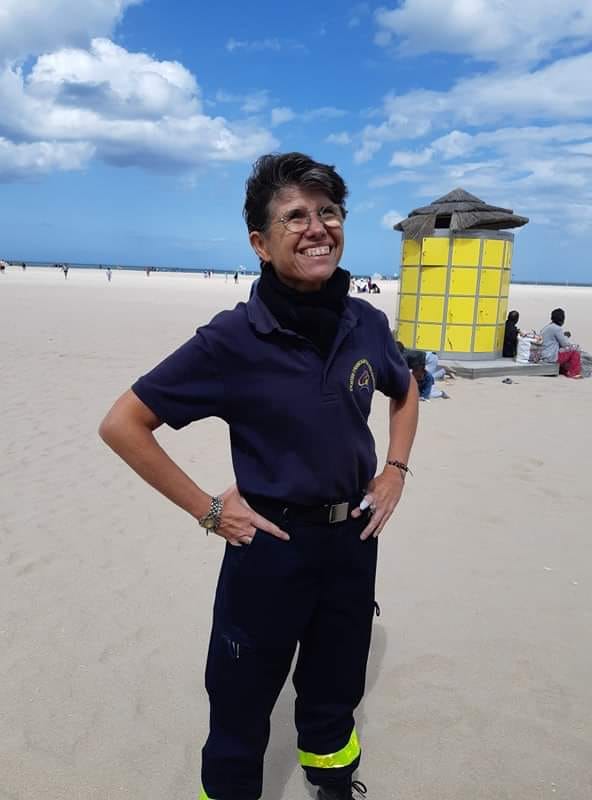Depression: “I was in denial...”
Published 20 Oct 2021 • By Candice Salomé
Hookette, a member of the Carenity community in France, has been affected by depression for many years. Recently, her depression has stabilised, thanks to a treatment regimen that suits her well, and she hopes to stop it soon. She looks back on the COVID-19 lockdown in March 2020, a difficult period for her.
Discover her story below!

Hello Hookette, thank you for agreeing to share your story with us on Carenity!
First of all, could you tell us a bit about yourself?
My name is Marie-Christine, I'm single, soon to be 57 years old. Hookette, my username on Carenity, stands for Hook, my husky who unfortunately disappeared.
 Photo courtesy of Hookette
Photo courtesy of Hookette
I am the youngest of 6 children with a big age difference with my elder siblings.
I am a carer and legal guardian for my sister who is 13 years older than me, following a badly treated meningitis in the 1950s.
I am an accountant and national épee fencing referee. This allows me to take my mind off things. I also do first aid training, I enjoy hiking, reading, and doing crossword puzzles as it relaxes me.
 Photo courtesy of Hookette
Photo courtesy of Hookette
Can you tell us how depression entered into your life? How long have you been diagnosed?
My depression started when I was about 17 years old. I was treated with Lexotan (bromazepam) and lost a lot of weight: from 9.5 stones to 7 stones. My GP at the time didn't want me to continue on this medicine.
Later, my depression returned, but I refused to put a name to it; I was in denial about it (loss of my mother to pancreatic cancer, my sister being put under guardianship, it was not easy, and other family problems were added on top of this). At the slightest inconvenience, I would be in tears.
People who know me well, such as my physiotherapist or Marion, my psychologist, realise when I am not doing well mentally.
I never talk about my unhappiness to those around me and especially not at work.
What care and treatment have you received? Are you satisfied with it?
It was a friend from the first aid service, with whom I talked a lot about my problems, who advised me to go to the CMP (medical and psychological centre). At first, I met with two professionals there.
After that, I met a psychiatrist who had difficulty convincing me that my GP should continue to prescribe my treatment.
I was taken on by Diane, my first psychologist, who left for Switzerland, and now by Marion. Each of them works differently.
My treatment is: 10 mg of Escitalopram, I've been on it for over 15 years. With my GP, we tried to lower the dose; I was on 5mg for 3 years but when I had problems with my sister, we agreed to increase the dose.
I am happy with my treatment and hope one day to be able to stop it completely.
What impact has depression had on your professional and private life?
I had a serious problem at work as well, so it wasn't easy. Even now, I'm always on the defensive.
When I'm not feeling well, I shut myself off. That's why I have very few friends, to my great regret, because I find it hard to reach out to others.
In early 2020 the COVID-19 pandemic was wreaking havoc and France experienced its first lockdown in March. What was that period like for you?
It was a very hard time for me mentally, in addition to the lockdown. My second sister told me that she had been diagnosed with cancer in both breasts, so she had to have an operation, and then she had an infection after her second day out, so she had to go back to the emergency room for a second operation...
Were you working from home during this period? What do you think about teleworking?
I was teleworking and I still continue to work from home now. I also go on site once or three times a month. The problem is that we no longer have a canteen.
Being a teleworker puts distance between me and the other departments, and I like to talk to people face to face when there is a problem. It's not really possible in home office.
The only good thing is that we don't have to take public transport now!
What impact did the lockdown have on your depression and overall health?
I didn't take the first lockdown very well. I had to make my sister understand that I was now with her 100%, so no more TV from morning to night. I allowed her to put it on from 11:30am to 1:30pm and in the afternoon after 4pm, paying close attention to volume on the TV so that it didn't bother me whilst I was working.
Meetings via video call instead of in real life take some getting used to.
I really missed activities like fencing competitions and walks on the banks of the Marne, which were made impossible because of limit on the number of kilometres we were allowed to be from home during lockdown.
You are a carer for your sister. Was this a difficult time for both of you? What impact did the lockdown have on her care? And yours?
I was lucky because we had just seen her GP before the lockdown so there was no problem there. The only thing she found difficult to understand was seeing her new neurologist by teleconsultation.
As far as I am concerned, I was able to have telephone contact with Marion before her maternity leave. During her maternity leave, she had left me in good hands. If I needed to, I could contact her colleague, and I thank them both for being there for me during this difficult time!
I really missed my physiotherapy sessions. I don't have the same GP as my sister, so I had to communicated with him by email as he knew my situation and that my body was acting up.
Could you tell us, with hindsight, how you think things could have been improved?
The lockdown could have been implemented in stages without a sudden stop of any and all activities overnight. People would have been able to better organise themselves. Some medical specialties should never have been shut down.
How do you see the future now? What are your plans?
I don't look to the future. I'm afraid of another lockdown at the beginning of the school year even though I'm vaccinated.
What do you think of patient exchange platforms like Carenity? Did it help you during the lockdown?
Carenity has been helpful to many of us in terms of mentally supporting ourselves and connecting to each other.
What advice would you give to Carenity members living with depression or to a loved one of someone with depression?
Pay attention to him or her, as depression is characterised by sadness, hopelessness, loss of motivation, eating and sleeping disorders.
The only person who knows you and who will not normally judge you is your GP: tell him or her about your unhappiness!
Any final words?
A big thank you to all of you!
Many thanks to Hookette for sharing her story with us on Carenity!
Was this testimonial helpful to you?
Give it a like and share your thoughts and questions with the community in the comments below!
Take care!

 Facebook
Facebook Twitter
Twitter


